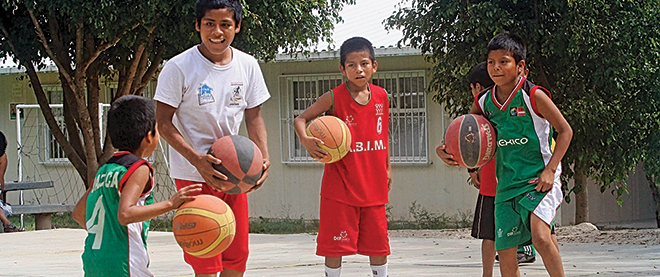Mexico’s ‘barefoot giants’ basketball team
A team of indigenous Trique boys shock the sporting world
Luis Alberto Cruz Hernandez / AP
Share

Basketball seems an unlikely sport in Mexico’s southern Oaxaca state, given the short stature of the local population. But a team of indigenous Trique boys—playing barefoot—won the International Festival of Mini-Basketball in Argentina, sweeping six South American squads. The youth tournament attracts Latin America’s top teams, so their forgoing of footwear attracted enormous attention, with competitors nicknaming them “the barefoot mice.” Mexican media outlets branded the boys the “barefoot giants” upon their return, while the president posed for pictures with the pint-sized sensations.
Their success showed a positive side of the Trique people and their territory—long a region rife with poverty and internal conflicts over politics, which have been settled with guns. “The biggest rival [for the Trique team] is hunger,” coach Sergio Ramírez told the newspaper Reforma.
Their success marked another basketball accomplishment for Mexico, which won the FIBA Americas Championship earlier this fall in Venezuela. The victories have also, ironically, drawn attention to the comparatively sad state of soccer in the country. The national team struggled in World Cup qualifying against Central American minnows and only made the tournament in Brazil by beating New Zealand in a last-chance series.
The success of impoverished indigenous kids caused comparisons to soccer—where players are well-paid and overseers include the wealthiest men in Mexico. “They’re true heroes, not only because they play their sport very well, but because they had to overcome so many obstacles, such as discrimination, abandonment, misery, racism, political [problems] and a lack of support,” says Wilfrido Mayrén Peláez, a Catholic priest and director of an Oaxaca human rights centre. “They’ve become an example—a message to all of us of: Yes, we can.”
Such optimism is at times a tough sell in Mexico, where classism can be common, connections are currency and indigenous populations are often forgotten. A further challenge for the Trique team is violence. Three rival groups have fought for political and social control in their territory in recent decades, with an estimated 1,000 murders over the last century among the Trique, who number fewer than 25,000.
Success for the Trique team goes beyond basketball. The boys must achieve As in school, speak the Trique tongue and help their families to be eligible for the squad, according to team coach Sergio Zúñiga. The children have “set an example of true change,” he says. “This is what has captured the imagination.”